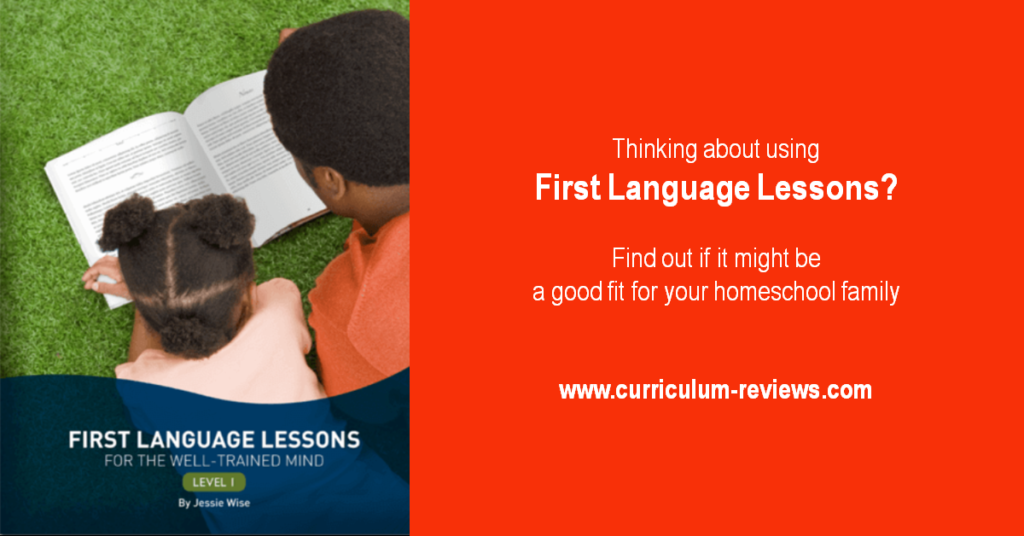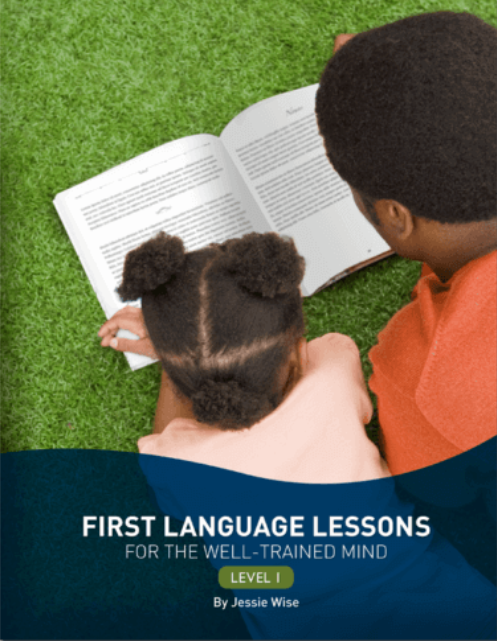
First Language Lessons
First Language Lessons is a teacher’s manual for introducing language arts to 1st through 4th grade students. Based on the classical principles of (1) Memory Work; (2) Copying and Dictation; (3) Narration; and (4) Grammar, you’ll find 100 short lessons per grade that you can use as a grammar primer. The second edition of this book presents the text in a much easier-to-read layout and design, without altering the actual content of the book.
The author, Jesse Wise (the author of The Well Trained Mind), presents a rule-based, narrative approach for helping children develop an ear for the correct use of language. What that means for your child is that they spend a lot of time listening to you read a script from the manual; reciting grammar rules 3 times in a row – 3 times a day – multiple days in a row; and answering a few oral questions each day.
Levels 1 and 2
Each lesson can be completed in 5 – 15 minutes each. Lessons alternate between reviewing basic grammar rules, memorizing poems, narration, and occasional copywork or dictation. The Level 1 book focuses on Oral Usage, while Level 2 requires more writing. Level 3 ———
Levels 1 and 2 include optional Enrichment Activities, such as drawing a picture of a cat and then looking up the word in an encyclopedia so you can brainstorm a list of adjectives and adverbs to describe different types of cats.
First Language Lessons does not follow a generally accepted list of grammar topics usually covered in 1st or 2nd grades. For example, while the Level 1 (1st grade) book exhaustively covers identifying different types of nouns, pronouns, and verbs in its first 90 lessons, it never explicitly touches the topics of how to make plural nouns, what is an adjective, or even how to properly use punctuation.
Aside from the Copywork and Dictation, you will not find daily written work to reinforce grammar skills. While there is ample opportunity to memorize poems and practice single sentence copywork, children are not expected to put skills into practice through the use of worksheets or other types of written exercises. While the manual provides periodic oral review lessons, there are no actual tests or formal written assessments to use.
The pace of First Language Lessons Level 1 may be a good fit for children who need constant review of essential concepts. However, some children will be frustrated with reviewing the fact that nouns refer to people for 16 lessons in a row – before moving on to learning how nouns can also refer to places. The pace of Level 2 picks up.
Levels 3 and 4
First Language Lessons for third and fourth graders still uses scripted lessons and memorization, but the scope of student work focuses on sentence diagramming. Students also get a number of lessons on letter writing skills and dictionary work. While still a year-long course, the authors recommend that you schedule lessons 2 – 3 times a week, with 30-minutes per lesson. Due to the amount of topic review in Level 3, you can actually start your grammar instruction with this level without worry of having missed foundational skills or knowledge if you didn’t complete Level 1 or 2. You will need to buy both the Instructor’s Guide and the Student Workbook for Levels 3 and 4.
Regardless of the level you use, weak auditory learners or children with poor short term memories may have difficulty finding success with First Language Lessons. Memorizing rules and poems can be tough, especially if the only way you’re learning is by listening. Parents can easily adapt to the needs of their child by creating mini-posters that provide visual cues and hang them on walls – but they’ll have to come up with this on their own, as First Language Lessons focuses almost exclusively on a child’s listening ability.
Finally, First Language Lessons provides moral lessons, sans a religious bent. Most of the narration lessons are classic fables or author written stories that extol the virtues or hardwork, cleanliness, and listening to authority. The teacher Q/A scripts used to reinforce lessons presume families are traditional, in that there is a mother and father and extended family members are active in the child’s life. Pronouns use the traditional male singular as an inclusive form for all students.
Date of Review: 11/06/2015


